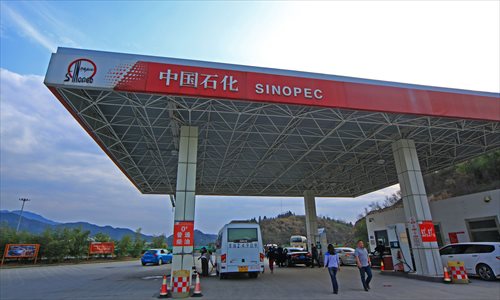Mixed-ownership no cure for all ills, say SOE officials
Enterprises must be operated on market principles

A Sinopec gas station in Nanjing, East China's Jiangsu Province Photo: IC
Mixed-ownership reform is not a panacea to the problems of State-owned enterprises (SOE) and the key to SOE reform is to allow SOEs to operate as market entities with minimum interference from the government, two SOE executives said at the Summer Davos Forum in Tianjin on Wednesday.
Mixed-ownership reform is a type of medicine which can cure diseases if it is adequate by itself. But problems may remain unresolved even after it is applied, Dong Mingzhu, chairman of Guangdong-based air conditioner manufacturer Gree Electric Appliances, a local government-owned company, said at the three-day forum which kicked off Wednesday.
The key to the reform is to bring the operation of enterprises in line with the market principles and ensure there is no administrative interference, Dong said.
Mixed-ownership will not necessarily be effective if the government still intervenes with administrative tools simply because it thinks it is a major shareholder or one of the shareholders, she said.
Dong's view was echoed by Fu Chengyu, chairman of China's biggest refiner Sinopec.
"Mixed-ownership reform does not represent all aspects of SOE reform or even not the major part of SOE reform, but only one part of it," Fu said.
China has stepped up efforts to reform its monopolistic State-owned sectors since the beginning of 2014.
More than 20 provincial-level governments have issued plans on SOE reform, with many pledging to allow more than 70 percent of the SOEs to develop mixed-ownership by 2017.
"It's true that no single medicine can cure all diseases. The mixed-ownership reform is essentially a reform of the property rights system and a measure through which SOE reform can make a breakthrough," Zhou Fangsheng, vice director of China Enterprise Reform & Development Society, told the Global Times Wednesday.
"The mixed-ownership reform aims to introduce private capital into SOEs and establish a modern corporate system where private and public shareholders can supervise each other to prevent a stakeholder to manipulate the way the enterprises are run," Liang Jun, a research fellow at the Guangdong Academy of Social Sciences, said Wednesday.
"So whether the mixed-ownership can work well depends on whether a modern corporate system can be put in place," Liang said.
China pledged to develop a mixed-ownership economy which features cross shareholding by State capital, collectively owned capital and non-public capital, at the Third Plenary Session of the 18th Communist Party of China (CPC) Central Committee in November 2013.
Many observers expect the mixed-ownership reform will be well on the agenda of the Fourth Plenary Session of the 18th CPC Central Committee scheduled to be held in October.
Meanwhile, Sinopec's Fu said he is ready to accept the government's recent decision to slash the salaries of top executives of pillar SOEs and financial institutions.
"For individuals, a pay cut is not a desirable thing. But it is in the interest of the State to do so," Fu said, noting employee morale is dampened if there is a big income gap between managers and employees.
Discussions on the pay cut for SOE executives became rife following a report by Caijing magazine in late August which said the annual salary of senior executives at central government-administered SOEs and State-owned banks would be capped at 600,000 yuan ($97,561) under a new rule.
"The pay cut affects only the executives of the first-tier SOEs who are assigned by the government. As far as the executives of the SOE subsidiaries and listed units are concerned, their pay will still be decided by the market rate," Zhou said.